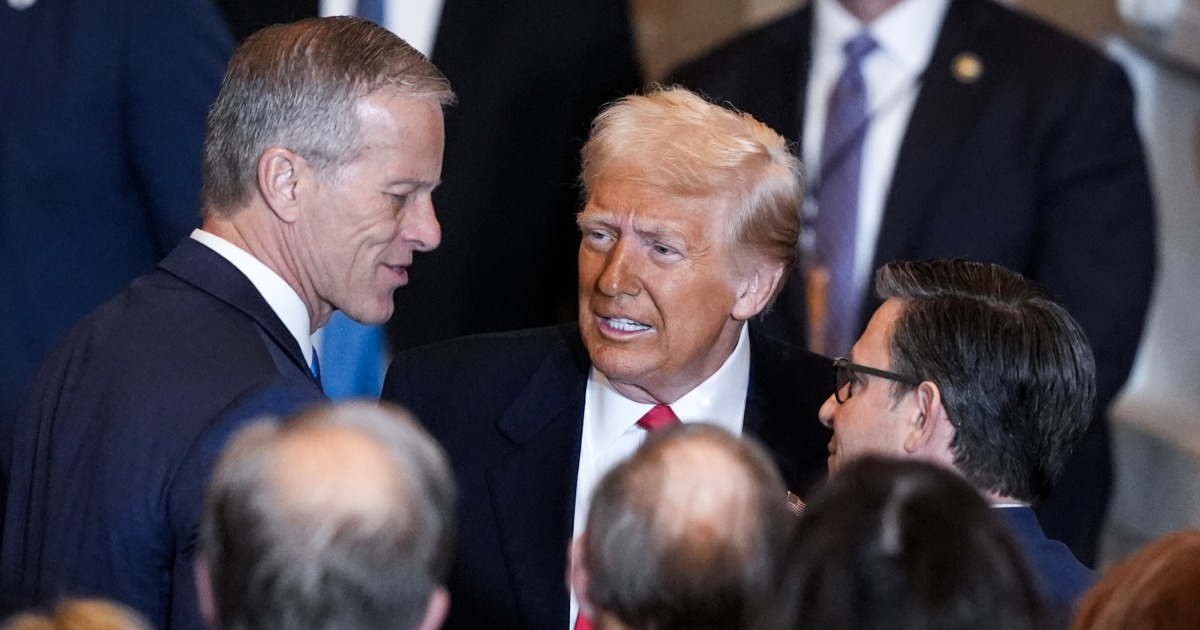UPDATE: President Donald Trump is urgently calling for Senate Republicans to eliminate the 60-vote filibuster rule to reopen the government, but his demand has hit immediate resistance from key figures within his own party. In a series of late-night social media posts on October 10, 2023, Trump declared, “It is now time for the Republicans to play their ‘TRUMP CARD’ and go for what is called the Nuclear Option — Get rid of the Filibuster, and get rid of it, NOW!”
Despite Trump’s pressure, Republican leaders swiftly reaffirmed their commitment to the filibuster. Newly appointed Senate Majority Leader John Thune, R-S.D., stated that his position on maintaining the legislative filibuster remains unchanged. Thune’s spokesperson, Ryan Wrasse, confirmed this stance, emphasizing its importance for legislative processes.
The backdrop for this escalating debate is the ongoing government shutdown, which has prompted calls from some Republicans, including Bernie Moreno, R-Ohio, to reconsider the filibuster. However, many GOP senators, including Jon Husted and Thom Tillis, have voiced strong opposition to the idea. Tillis stated, “We stood firm there,” referencing similar calls from Trump during his first term. “I can’t imagine anybody changing now.”
Senator Roger Marshall, R-Kansas, labeled the idea of weakening the filibuster as a “nonstarter,” while Markwayne Mullin, R-Oklahoma, firmly rejected the notion of abolishing it entirely. “The Senate goes back and forth, and it’s in our favor when we have the minority,” he noted.
Since its establishment in 1975, the filibuster has required 60 votes for most legislation, serving as a significant barrier to majority rule. The GOP has previously utilized exceptions for judicial confirmations and executive appointments, but the legislative filibuster remains a contentious issue. With the current shutdown impacting millions, the stakes are higher than ever.
House Speaker Mike Johnson, R-La., acknowledged the Senate’s traditional support for the filibuster, noting its role as a crucial safeguard. He commented, “If the shoe was on the other foot, I don’t think our team would like it.”
In a stark contrast, Democrats are challenging Republicans to act decisively on the filibuster. John Fetterman, D-Pa., urged GOP members to “carve it out” for government funding bills, stating, “We all ran on it.” Meanwhile, Representative Chris DeLuzio, D-Pa., bluntly suggested that Republicans “should have” eliminated the filibuster if they preferred not to negotiate with Democrats.
Trump’s comments come in the wake of previous failed attempts by Democrats to amend the filibuster rules for legislation like voting rights, underscoring the political maneuvering surrounding the issue. He warned that if Republicans do not utilize their power now, a future Democratic majority would swiftly abolish the filibuster when they return to power.
As the debate intensifies, the future of the filibuster and the potential resolution of the government shutdown hang in the balance. Key Republican figures continue to stand firm against the abolishment, emphasizing the need for bipartisan cooperation.
What happens next? The Senate is expected to remain on high alert as discussions continue, with the potential for further conflict between Trump and GOP leaders. The urgency of the situation calls for immediate attention as the clock ticks on the government shutdown, affecting countless Americans.







































































